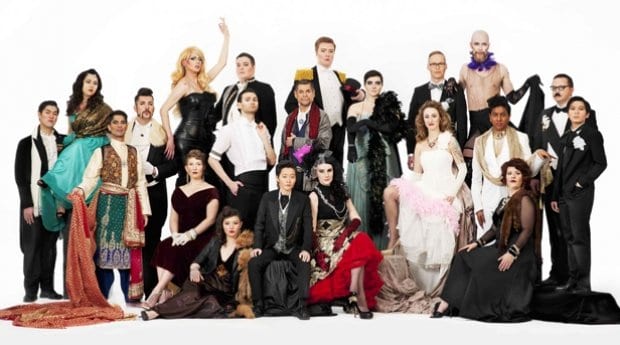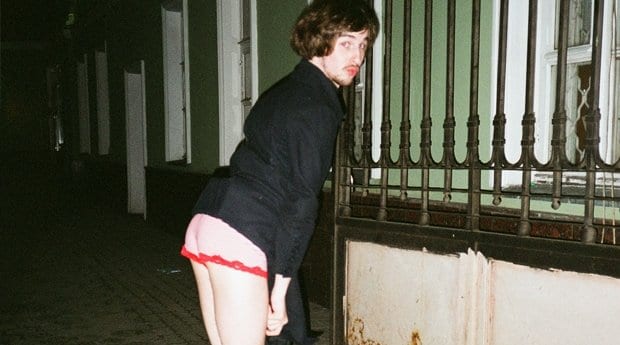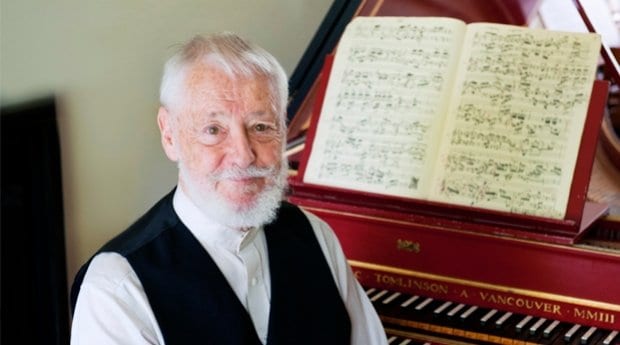
“It was really interesting to see how comfortable people got so quickly because we didn’t have to pretend,” says Missy Clarkson, managing director of queer choral group Cor Flammae, which will debut at the Queer Arts Festival on Thursday, July 24. Credit: Cor Flammae

Photographer Andrew Kounitskiy’s images, taken in his home country of Russia, will be displayed in this year’s art exhibition, Queering the International, at the Queer Arts Festival. Credit: Andrew Kounitskiy
For Rachel Iwaasa, ReGenerations means cultivating new connections across age, boundaries, experience and borders.
“This year our focus is on mentoring tight relationships,” the artistic director of Vancouver’s multidisciplinary Queer Arts Festival (QAF) says. Whereas previous festivals have facilitated shorter workshops and mentorship programs, this year’s programs will last longer and, she hopes, go deeper for participants and mentors alike.
One such participatory workshop spent two months encouraging gay refugees and immigrants to express themselves through painting, assisted by mentors from Jordan and Colombia. The results will be shared during the festival along with an international art exhibition, curated by multidisciplinary artist Laiwan, called Queering the International, which will feature the work of established and emerging gay artists from around the world.
“Art is meant to expand our perceptions, expand our worldview,” Laiwan says, “and I think it won’t do that if we’re not including people from everywhere in the world. That is my interest here, to bring all of those worlds into this exhibition at the Roundhouse.”
A prominent figure in Vancouver’s art scene since founding Or Gallery in 1983, Laiwan has brought together 21 queer artists from backgrounds as diverse as Russia, Iran, Hong Kong and Trinidad to speak visually about their particular experiences.
“We’re not that much different on another level from some of the things that people in different parts of the world experience,” Laiwan says. “They just might be different in scale, and they might be different in terms of spectacle. It’s not about comparing us, saying that we have it easy here compared to there, but to be able to say, ‘In what ways can we be better allies or have better networks around this?’”
One of the more controversial — and well-known — of the visiting artists is South African “visual activist” Zanele Muholi. In her home of South Africa, lesbians, especially black lesbians, live in daily fear of violence and death. Using almost an anthropological portraiture approach to photography, Muholi has documented lesbian lives, deaths and relationships in South Africa, including her own, since 2006.
Her work has been publicly derided at home; in 2009, it was called “pornographic” and “immoral” by then-minister of arts and culture Lulu Xingwana. It has also been widely appreciated and exhibited, including in a current solo show at Ryerson University in Toronto.
Other notable artists exhibiting at Queering the International are Canadian filmmaker John Greyson, who was detained in Egypt in 2013, and Tejal Shah, an Indian lesbian video artist who describes her gay- and feminist-focused art as “political” in a country where homosexuality was recriminalized last year.
Many refugee artists living in Canada will also be featured in the show, offering unique perspectives as newcomers and, at times, outsiders to Canadian society. “I see the project solely as a seed; it’s like a beginning,” Laiwan says. “The show really celebrates the variety of experiences that people come from. So it’s not homogenous, it’s not simple; a lot of the stories are very complicated.”
Another group of artists attempting to tell heretofore untold stories is Cor Flammae, an all-queer professional classical choral group dedicated to queer-focused content that bills itself as Canada’s first such ensemble.
Managing director Missy Clarkson was so inspired by a performance at last year’s Queer Arts Festival that she quickly rounded up 21 eager singers and two composers from Vancouver’s professional choral scene.
The timing was right, she says. “They came out of the woodwork and word spread … I could tell that there was a need, because the answer was always resoundingly, ‘Yes, I want this, this is my dream, let’s do it,’” she says.
Clarkson and co-founders Madeline Hannan-Leith and Amelia Pitt-Brooke brought the idea of a Cor Flammae festival performance to the QAF board, and the answer, again, was a resounding ‘yes,’ she says. “They said, ‘We don’t have the money, and we don’t have the room, but we’re going to find some money, and we’re going to make some room.’”
The choir’s performance on July 24 is meant to highlight hidden stories from classical music’s queer history, but that’s not the only objective of the group’s formation: it’s a way for queer choral singers to open up and be themselves while practising their art, where often it’s one or the other, Clarkson says.
“People don’t necessarily feel entirely welcome to be their full selves. There’s a lot of erasure,” she explains.
“It was really interesting to see how comfortable people got so quickly because we didn’t have to pretend, because you’re usually wearing a muumuu with shoulder pads, and maybe you want to be wearing a suit, and maybe you’re singing and pretending that you don’t have a same-sex partner.
“We have a comfortable connection to each other, to the composers,” she says. “We just want to do justice to the experience of the music, and hopefully that’s what we do.”
Colin Tilney, who turns 80 this year, has emerged as a leader in the last few decades of classical music, performing pieces with the instruments for which they were originally composed. The early-music pioneer, whose body of work includes a long list of prestigious harpsichord and piano recordings, doesn’t open up readily, preferring to keep his private life private.
“Having been conventionally married for the first half of my musical life, with two daughters, it’s not likely that I should have experienced discrimination,” Tilney says in an email to Xtra.
He and his current partner married three years after Canada legalized same-sex marriage. “When my partner, William, retired in 1988, the RTO [Retired Teachers of Ontario] allowed us joint medical coverage under common law,” Tilney says. “When we married in 2008, it was partly to confirm what we feel for each other and partly to set our future life together on a firmer and clearer foundation.”
Despite his reserved demeanour, Tilney reveals that one of the highlights of his career was “delighting my partner on our first meeting by playing him Scarlatti in the nude.”
Tilney’s upcoming QAF performance, entitled Colin Tilney Celebrates LXXX, will include music by Scarlatti, as well as by Bach, Couperin and South African lesbian composer Priaulx Rainier.
Having lost, then regained, three quarters of its federal funding last year and more recently received stable operating funding from the BC government as well as a five-percent increase from the federal government, Iwaasa says the festival is financially secure for now.
Still, she hopes community members will contribute to the festival’s future to shift its reliance away from government funding. “One of our goals this year is to talk to our audience and community, who aren’t necessarily used to thinking of the Queer Arts Festival as a place where they can go for their taxable donations,” she says.
“It would be fair to say that we are one of the fastest-growing cultural festivals in Canada,” she says. “We have an incredible pool of artists to choose from. It makes it very easy to curate a festival that’s going to be amazing. It’s not hard to find great queer artists.”
Queer Arts Festival
Wed, July 23–Sat, Aug 9
Roundhouse Community Centre, 181 Roundhouse Mews
queerartsfestival.com

 Why you can trust Xtra
Why you can trust Xtra


